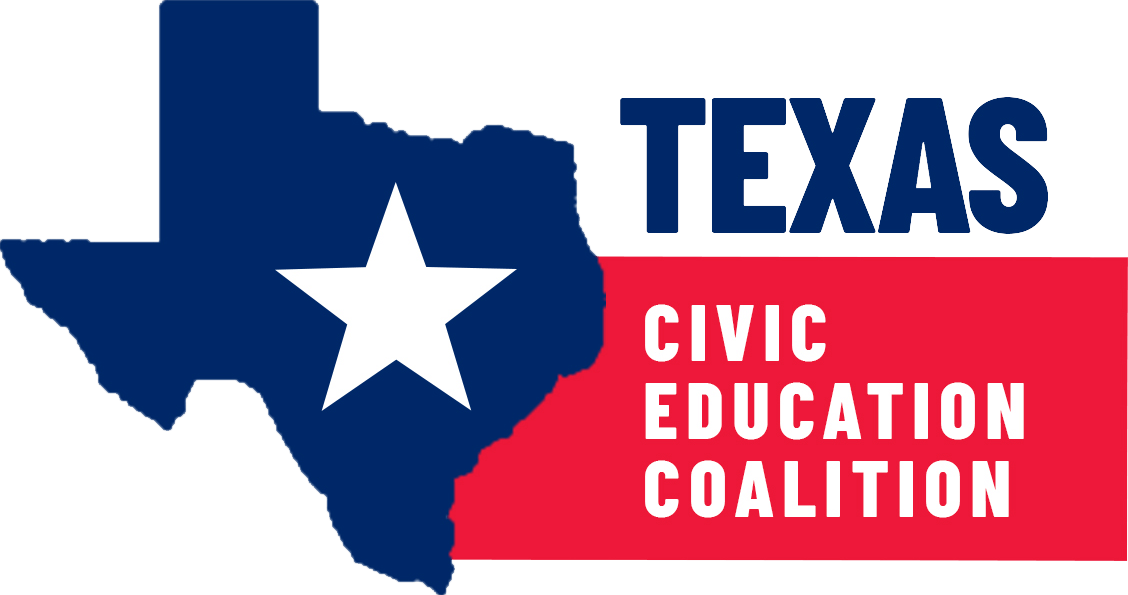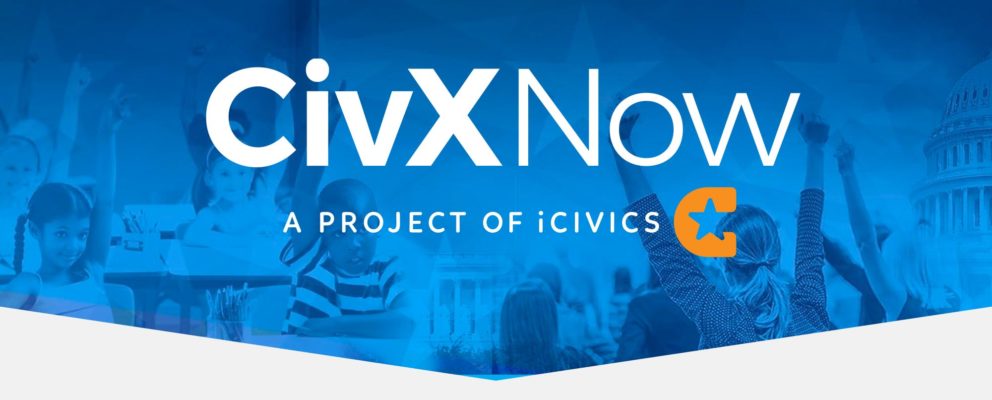Also see article at Medium.com
This month’s member spotlight highlights the work of the Texas Civic Education Coalition. Wendy May-Dreyer, a retired Texas attorney and Chairman of the Board for iCivics, took the CivXNow mission to the state level in Texas and kicked off the Texas Civic Education Coalition. This Q&A will dive into the work of the Coalition, which is organizing educators, legislators, elected officials, and vendors from across the state of Texas to take a holistic approach to civic education reform in the Lone Star State.
Q: What is the goal of the Texas Civic Education Coalition?
May: To bring comprehensive, non-partisan civic education back into the classroom in a way that resonates with and excites twenty-first century learners. Texas, unlike many other states, already has some good civic teaching standards that we can build upon to improve civic learning. Importantly, we need to ensure that our students are learning early and often the appropriate civic knowledge, values, and attitudes needed to invest them in our democratic system of government. The Texas Coalition’s approach is research-based, consensus-built, teacher-approved, and bi-partisan supported. We will address civic educational improvements in Texas through the legislature, but also and perhaps more importantly, through revision and streamlining of the state’s teaching standards (Texas Essential Knowledge and Skills aka TEKS), school and student civic achievement recognition programs, and funded teacher professional development.
Q: Tell us about the teacher-centered approach.
May: We started with the teachers and what would practically help them master and teach civic knowledge, civic skills, civic attitudes, and civic behaviors integrated into their busy schedule. Too often other groups that pursue education improvements self-determine what’s best. They go straight to the legislature or Board of Education to push their agenda, then end up mandating things that only require more work for teachers and do not actually improve the situation in the classroom. Our Coalition started with the education research and the substantial teacher and administrator networks of our Coalition members.
Q: What is the game plan for the Coalition?
May: The Texas Civic Education Coalition uniquely includes all the major education organizations and agencies that impact social studies in Texas as well as industry providers and experts. We’re coming at this with a group that is very in tune with the on-the-ground situation in Texas. It gives us the ability to really custom design what we’re doing to get the most impact, but in a way that helps teachers work smarter, not harder. Also, Texas is ripe for this effort: society as a whole has become increasingly aware of the decline in civic knowledge and values; Texas has a history of leading education movements.The Governor’s agenda includes civic education, the state’s biannual legislature meets next year, and the social studies TEKS are already scheduled for a major revision. You might say the stars have aligned, and the Texas Coalition is poised to move on this opportunity.
Q: What are the underlying principles of the goals for the Coalition?
May: We know that, while some states have been able to mandate a full civics course, the required courses in Texas won’t allow for that kind of time. The teachers wouldn’t want that, and it would not be feasible in their day to prescribe it. We know that because we know Texas. But what we also know is there are lots of places within other crucial subjects that are already being taught where we can better integrate civics content. What we’re questioning is, “How can we take the necessary civics content and better integrate it into the existing social studies and even ELA content so that you have a robust integration that allows teachers to cover the necessary issues under those four civic pillars without adding more time?”
Q: How is this endeavor in Texas unique?
May: Texas does things its own way: the way our legislative system is set up, the powers of our Board of Education, the active involvement of our Commissioner of Education are different than some other states. We must also consider that the state is huge geographically and has a tremendous amount of diversity from a socioeconomic standpoint. We have to make sure that anything we put into place is actually feasible and fair in a variety of different districts and realities. The Commissioner of Education is very attentive to that issue. But again, the power of our Coalition is that our members are very in tune [to the needs] throughout the state of Texas. So when we’re doing professional development, when we’re suggesting appropriate revisions to the TEKS, when we’re talking to legislators, we can bring to that a level of expertise about what will work throughout the totality of Texas and not just in certain geographic regions or with certain socioeconomic status school districts.
Q: Who belongs to the Coalition?
May: We are the only collective group in Texas working towards this goal. We have included committed representatives from all three branches of government, which is very important. All three branches are working with us in our efforts to improve civic education in Texas. At the same time, we are working with the Commissioner of Education and the Texas Education Agency as well as the Board of Education on our non-legislative goals and to leverage their expertise and support while we also lend our members’ expertise to them.. Our membership runs the gamut of education providers and vendors, special interest groups, industry experts, universities, presidential libraries, and philanthropists. It includes every significant education organization in the state that deals with social studies. In total, there are more than 100 members and we are growing every day.
Q: How important is it to have a bi-partisan Coalition?
May: Our membership is intentionally multi-partisan. Most of the participating groups are non-partisan, but we have included a balance of interested groups that align politically with the right and the left. We believe our goals and work are nonpartisan in nature — this is about investing in making good citizens who are committed to our constitutional republic. This is an all-hands on deck effort, and there’s an understanding here in Texas that civic education is a top priority regardless of your political ideology. There’s a very real opportunity here to work on this in a meaningful, multi-partisan way. And isn’t that the example we should be demonstrating for our students?
Q: So where are you now in the process?
May: The legislative session starts in January 2021. We are preparing to have the bill submitted with bipartisan support on day one. We have a legislative strategy task force that is working on that now. This is a multi-partisan group. We also have an education content committee and other education specialists advising on the legislation content so we can make sure we have consensus and a bill that will appropriately set parameters for the subsequent TEKS enhancements and other programming goals.
Q: What is the state of civics in Texas right now?
May: It’s better than a lot of states in that we do have civics requirements within the K-12 strands. That doesn’t mean there’s not plenty of room for improvement. Where we really could use more focus is on developing appropriate civic attitudes, even at early ages — building a sense of community and the sense of responsibility to community, a sense of what it means to be an American citizen, part of a democracy, and wanting to participate in your own system of government. We also need more work in developing civic behaviors, giving students more opportunities to really see how civics applies in their everyday lives in order to help them develop the inclination to actually engage throughout their lives.
Q: How is this effort different from efforts in the past in Texas?
May: There has never been a wholesale effort like this. There have always been strong groups doing great work individually, often separated from the education organizations’ and agencies’ agendas. Maybe two or three organizations have come together trying to tackle one problem or project at a time. This is the first time all of those groups are now members of one coalition and have signed off on and expressed willingness to work together to come up with a cumulative, comprehensive plan that significantly moves the needle forward. Plus, as already discussed, the foundation of our goals is what will work in the classroom and across this great state.
Q: Have you had any major sticking points, and how have you worked through them?
May: The first thing that comes to mind is the same complication the world is experiencing right now: COVID-19. We were moving with great momentum and lots of energy; we were in conversations with the Governor, legislators, the Commissioner of Education, the Texas Supreme Court, and funders. We were positioned to really start solidifying plans even for this summer. Then the virus hit and, rightfully, health and safety along with a major pivot in education became the top priorities; it’s taken everybody’s attention away momentarily and perhaps slowed some of our plans. But I would say, at the same time, when everyone stops and sits back, the situation will demonstrate more than ever the need for civics education. This crisis certainly shows how important it is for people to understand how their government works and what their government can and can’t do for them, how state and federal governments interact with each other, and how important community responsibility is.
Share Insights from Wendy on Social Media
“[The TX Coalition] started with the teachers and what would practically help them master and teach [civics] integrated into their busy schedule. Too often other groups that pursue education improvements self-determine what’s best.” #CivXNow
“[T]his is about investing in making good citizens who are committed to our constitutional republic. This is an all-hands on deck effort, and there’s an understanding here in Texas that civic education is a top priority regardless of your political ideology.” #CivXNow
“[M]ore focus [should be on] civic attitudes, even at early ages — building a sense of community and the sense of responsibility to community, a sense of what it means to be an American citizen, part of a democracy, and wanting to participate in your own system of gov.” #CivXNow
“We also need more work in developing civic behaviors, giving students more opportunities to really see how civics applies in their everyday lives in order to help them develop the inclination to actually engage throughout their lives.” #CivXNow
“This [Covid] crisis certainly shows how important it is for people to understand how their government works and what their government can and can’t do for them, how state and federal governments interact with each other, and how important community responsibility is.” #CivXNow

